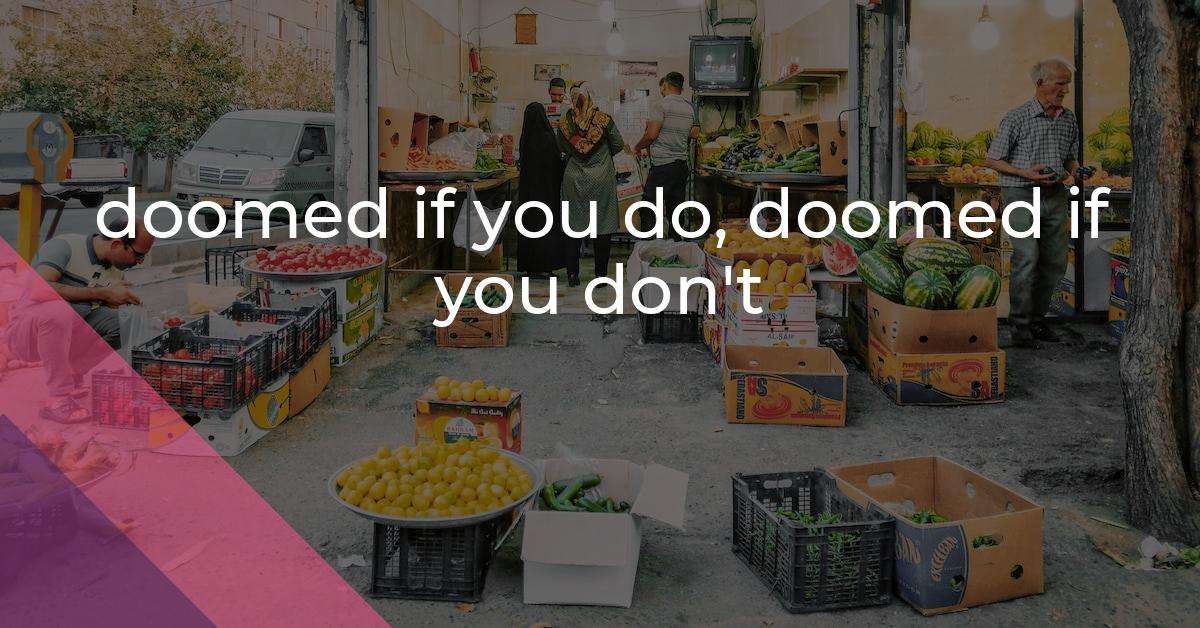doomed if you do, doomed if you don’t: Idiom Meaning and Origin
What does ‘doomed if you do, doomed if you don't’ mean?
The idiom "doomed if you do, doomed if you don't" refers to a lose-lose situation, where any choice or action will lead to negative consequences or a bad outcome.

Idiom Explorer
The idiom "lead nowhere" means that a situation or action has no positive outcome or result. It implies that the efforts put into something are futile and will not lead to any productive or useful outcome.
The idiom "lady or tiger" refers to a situation where there are two equally probable outcomes, one favorable and the other unfavorable, resembling two doors. The outcome can be unpredictable or dependent on unknown factors.
The idiom "kiss of death" refers to an action or event that leads to certain failure or ruin. It implies that something or someone has a detrimental or fatal effect on a situation or outcome.
The idiom "if anything" is used to express the idea that something is unlikely or even the opposite of what is expected. It introduces a slight doubt or contradiction in a statement.
The idiom "high-stakes" refers to a situation in which there is a significant potential gain or loss, usually involving a lot of money or important consequences.
The idiom "hell to pay" means to face severe consequences or trouble for one's actions or decisions.
The idiom "hell mend someone" means that someone will have to suffer the consequences or outcomes of their actions, usually in a negative way.
The idiom "hell if I know" is used to express a lack of knowledge or understanding about something.
The idiom "had better" is used to advise or warn someone about a particular action they should take in order to avoid a negative outcome. It implies a sense of urgency or necessity, often indicating that there may be negative consequences if the suggested action is not followed.
The idiom "go wrong" means that something does not go as planned or expected, and results in a failure or a mistake.
No Escape
The idiom "damned if one does and damned if one doesn't" is a phrase that is commonly used in English language. It is believed to have originated from the phrase "damned if I do, damned if I don't," which appeared in writing as far back as the 17th century. The phrase underwent slight modifications over time, leading to its current form.
This idiom is used to express a situation where no matter what choice or action one takes, the outcome is likely to be negative or unfavorable. It highlights the dilemma faced by an individual who is caught between two equally undesirable choices or courses of action.
The phrase often reflects a sense of inevitability and hopelessness. It conveys the idea that no matter what decision is made or action is taken, there will be negative consequences. It suggests that the situation is so bleak that there is no way to avoid an undesirable outcome.
This idiom is frequently employed in a variety of contexts. It can be used to describe personal, professional, or societal predicaments where all available options are unsatisfactory. The phrase can be used to convey frustration, resignation, or a sense of powerlessness when faced with a lose-lose situation.
The use of the phrase "do-or-die" is another idiom that is related to "damned if one does and damned if one doesn't." This phrase is often used to describe a situation where success or survival depends on a particular course of action. It conveys a sense of urgency and emphasizes the high stakes involved. It suggests that failure is not an option and that one must give their all in order to achieve the desired outcome.
The idiom "cut both ways" is also related to the idea of being "damned if one does and damned if one doesn't." This phrase is used to describe a situation where an action or decision has both positive and negative consequences. It suggests that one must weigh the potential benefits against the potential drawbacks before making a choice. It highlights the complexity and nuance involved in decision-making and emphasizes the need to consider all possible outcomes.
The idiom "Catch-22" is yet another phrase that is related to the concept of being "damned if one does and damned if one doesn't." This phrase originated from Joseph Heller's novel of the same name and refers to a paradoxical situation where one is trapped by contradictory rules or requirements. It suggests that no matter what action one takes, they are unable to escape the negative consequences. It highlights the absurdity and frustration of being caught in a no-win scenario.
The idiom "hell to pay" is also relevant to the idea of being "damned if one does and damned if one doesn't." This phrase is often used to describe a situation where one will face severe consequences or punishment regardless of the choice or action taken. It suggests that there will be a high price to pay for any decision made. It conveys a sense of impending doom and emphasizes the seriousness of the situation.
Overall, the idiom "doomed if you do, doomed if you don't" encapsulates the frustration and hopelessness experienced when facing a situation where all available choices or actions lead to negative outcomes. It conveys a sense of inevitability and highlights the lack of viable options. Though it may not offer a solution or resolution, it serves as a powerful expression of the challenges and dilemmas encountered in various aspects of life.
Example usage
Examples of how the idiom "doomed if you do, doomed if you don't" can be used in a sentence:
- If I tell my boss the truth about the mistake, I'll be fired, but if I don't, I'll lose my integrity. It's a "doomed if you do, doomed if you don't" situation.
- He was faced with a choice between betraying his best friend or betraying his family. Either way, he was "doomed if he did, doomed if he didn't."
- She couldn't decide whether to accept the job offer and risk being overworked, or decline it and potentially miss out on a great opportunity. It was a classic example of "doomed if she did, doomed if she didn't."
An analysis of the idiom "doomed if you do, doomed if you don't" reveals that it often refers to a situation where all available options lead to negative or unfavorable outcomes. It highlights the sense of being trapped or forced into a lose-lose scenario.
The idiom emphasizes the sense of hopelessness and inevitability, as no matter what action is taken or not taken, the result is unfavorable. It underscores the feeling of being damned regardless of the chosen course of action.
This idiom is commonly used to describe dilemmas, choices, or decision-making situations where all alternatives seem equally undesirable. It emphasizes the unfortunate nature of the situation and the lack of a satisfactory solution.
More "Dilemma" idioms



